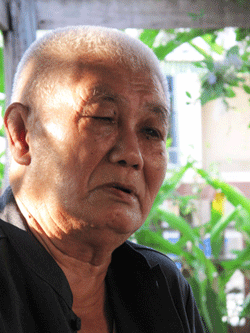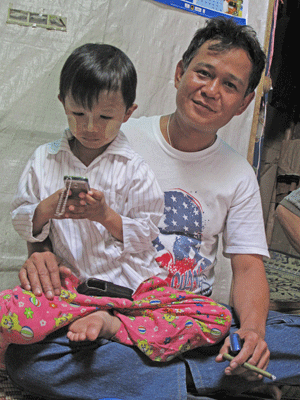
| By KYAW ZWA MOE | MAY, 2010 - VOLUME 18 NO.5 |
Every Burmese refugee has his or her own story of escape—from political persecution, from economic hardship, from the violence of civil war.
Driven more by fear and hardship than by hope, they come here to escape the ravages of war and repression in Burma, not knowing what awaits them when they cross the border into Thailand.
Whether they are subsistence farmers or highly educated professionals, rebels or ordinary citizens, their lives are suspended—often for years or decades—between a traumatic past and an uncertain future.
What they all have in common is loss: every person who has fled to the border has lost something essential and is in danger of losing what little they have left. Many flee because their homes, their families or their livelihoods have been taken away from them. Some are missing limbs, while others are afflicted by hidden wounds. Often, the only thing they still possess is the will to live. Many want to fight back, but most must struggle simply to survive.
It is impossible to tell the stories of all who have come to the Thai-Burmese border. But each story that gets told sheds light on an area of darkness and offers an insight into life in the shadows of Burma's endless war against itself.
Than Sein, the Old Soldier
Every hair on Than Sein’s head is white. It’s not just because of his age—he’s 83—but also because for most of his life, he has been a warrior of one kind or another. Since entering the Burmese army in 1950, when Burma was still a democracy, he has fought one battle after another—against insurgents, against the military regime that seized power in 1962, and against the steady decline in revolutionary zeal that has sustained him since he left Burma nearly 40 years ago.
 |
| Than Sein (Photo: KYAW ZWA MOE/THE IRRAWADDY) |
These days, he brings his combative nature to the task of chairing the Parliamentary Democracy Party, formed in 1969 by ousted premier U Nu, Burma’s first and only democratically elected prime minister.
In 1971, Than Sein went to the jungles of the Thai-Burmese border to join the struggle against the dictatorship of Gen Ne Win. Although U Nu returned to Rangoon in 1980 under an amnesty offered by Ne Win, Than Sein refused to budge. “I didn’t go back because I didn’t want to surrender,” he said.
After the nationwide uprising against military rule in 1988, he saw a revival of the fighting spirit that he knew so well. The protests were crushed by a military crackdown, and thousands of students fled to the border to take up arms against the newly installed regime. Than Sein formed a unit of 50 soldiers ready to die for the cause. But this movement soon began to unravel, as divisions among opposition groups surfaced.
“The revolution is like a mothball in the closet. It’s slowly vanishing,” he said, lamenting the lack of unity that has long weakened Burma’s ability to resist successive military regimes.
But for his part, there is no giving up. Wearing his distinctive red Mon longyi (most people call him U Mon Gyi, because of his Mon ethnicity), he defiantly dismisses the upcoming election as a sham. So what does he propose? “Dialogue would be a solution,” he said sharply, showing that even in his present guise as a politician, there is still something of the soldier in him.
Kyaw Soe Win’s Long and Winding Road
 |
| Kyaw Soe Win and his son (Photo: KYAW ZWA MOE/THE IRRAWADDY) |
In the early 1990s, he spent five years in Rangoon’s infamous Insein Prison. He said it was like being back in his mother’s womb again. Why? Because he shared a tiny cell with his twin brother. The two brothers were arrested for launching a poster campaign against the junta-organized National Convention in 1993.
Nearly a decade after his release, Kyaw Soe Win was once again a wanted man. In 2007, he took part in the monk-led Saffron Revolution before fleeing a ruthless crackdown on protesters. This led him to seek asylum at the Umpiem Mai refugee camp in Thailand, where he and his wife and son now await a chance to resettle in a third country.
His son is now his greatest hope. He dreams of a bright future for him in the West, where he should be able to get a good education. But sometimes the five-year-old boy doesn’t understand why they had to leave their relatively comfortable life in Rangoon to live in a hut that feels like it could be blown away by the wind at any moment.
Kyaw Soe Win knows that sometimes you have to take a step backward before you can go forward. Even so, it is hard to bear being confined again in conditions that are not much better than those he experienced in prison. When he begins to feel that his life is going nowhere, he likes to sit on a rock that looks down over a twisting and turning road that heads into Mae Sot.
“This is the only time I feel any relief,” he said, pointing toward the road that he hopes will one day take him away from this place, never to return.
Than Hla, Burma’s Nelson Mandela
Burma has at least 2,100 political prisoners in detention, but even this number is small compared to all those who have served time for their political convictions over the past half-century of military rule. Of these untold thousands of former political prisoners, however, only one can claim the distinction of being called “Burma’s Nelson Mandela.”
 |
| Than Hla (Photo: KYAW ZWA MOE/THE IRRAWADDY) |
Than Hla, 63, is a square-jawed man with eyes that light up when he talks about his many battles with “the enemy”—Burmese government troops. But his real claim to fame among residents of the Umpiem Mai refugee camp is that he has spent nearly as many years behind bars as the former South African president, who was imprisoned for 27 years for leading the struggle against Apartheid.
In Than Hla’s case, it was his 20-year career as a soldier for the Karen National Union (KNU) that landed him in prison. He joined the KNU when he was just 16, leaving his village in the Irrawaddy delta for a life of warfare. He can recall many battles, but the one he remembers most vividly was his last, fought in 1983 in the Pegu Yoma mountain range, where he was one of 60 rebels who finally succumbed to the Burmese army’s “four cuts” strategy, depriving them of food, funding, recruits and information.
Even though they had been tracked down by 10 Burmese army battalions, he insists that they could have kept fighting. “But we had nothing to eat, not even salt,” he said.
The captured KNU troops were sentenced to death or life imprisonment. Than Hla and his father-in-law were among those singled out for execution, but in 1989 this was commuted to life imprisonment under a general amnesty. His father-in-law eventually died behind bars, but Than Hla was released in 2005, after serving nearly 23 years.
Although most of his fellow refugees know him as one of Burma’s longest-serving political prisoners, it is clear that he sees himself in a different light. He still believes that the fight against military rule must go on, despite the junta’s claim that it is moving toward democracy.
“I support all methods that are used against the military regime,” he said. “Personally, I believe in armed struggle. If my knees were good, I would fight again.”
Zay Yar Nanda, the Boy Breadwinner
 |
| Zay Latt (left) and Zay Yar Nanda (Photo: KYAW ZWA MOE/THE IRRAWADDY) |
When Zay Yar Nanda was 13, his father, Zay Latt, told his mother that he was going to take their children to Shwedagon Pagoda and Happy World, a popular amusement park in Rangoon. Zay Yar Nanda and his 4-year-old sister enjoyed the outing, but it didn’t end at a fun park. After a grueling journey through eastern Burma, they found themselves in a foreign country, in the Thai border town of Mae Sot.
Zay Latt took his children to Thailand because he was being pursued by the authorities for his role in the 2007 Saffron Revolution. Although Zay Yar Nanda knows very little about politics, he has always respected his father, a former political prisoner, for his dedication to the democracy movement. So he never complained about having to leave their home in Rangoon or their new life at the Nu Po refugee camp.
Now aged 15, Zay Yar Nanda has become a breadwinner, helping to support his family by running a noodle shop in the camp. He wakes up early every morning to open the shop and cook spicy Arakanese-style noodles. The business earns about 150 baht (US $4.50) a day.
When he’s not busy working, Zay Yar Nanda helps other children in the camp to learn English. “We read from English books like ‘Treasure Island,’ and I help them to understand the words,” he said.
Although his English lessons are free, Zay Yar Nanda has found a way to make money from his language skills. Recently, he started translating articles from news magazines like Time and Newsweek into Burmese. His translations are published by exiled Burmese publications, which pay him 200 baht ($6) per article.
So what does this bright, hardworking boy want to do with his life?
“I want to be a general in the US military,” he said. “I am now studying world history to be ready to take an exam to attend a university in the US.”
But before that can happen, he and his family must wait to be accepted for resettlement.
Kyaw Zaw: Like Father, Like Son
When Kyi Tin Oo, a poet, was released from 10 years’ imprisonment in 2004, he immediately flew to Kalaymyo, a town in a remote corner of Sagaing Division near the border with India, where his son, Kyaw Zaw, was serving his second sentence as a political prisoner.
 |
| Kyaw Zaw (Photo: KYAW ZWA MOE/THE IRRAWADDY) |
Through the prison bars, he joked with his son, thanking him for giving him an opportunity to fly for the first time in his life.
Barely two months after his trip, paid for by the International Committee of the Red Cross, Kyi Tin Oo died of heart disease. He was just 60.
Four years later, Kyaw Zaw fled from Burma to escape being arrested a third time. He now lives in the Nu Po refugee camp.
Those who knew Kyi Tin Oo in prison blame his death on his lengthy imprisonment. But Kyaw Zaw doesn’t hold a grudge against anyone for his father’s fate, or for his own hardships behind bars. Asked who the culprit was, the 37-year-old former political prisoner said, “It’s the system: the military dictatorship. We must change it.”
About his own political activities, he takes a similarly impersonal view. He doesn’t speak of his commitment, but of an irresistible compulsion to keep fighting military rule: “It’s like heroin. You can be addicted to politics and it’s hard to quit once you start. Whenever, wherever, whatever, I have to do everything I can to end this nightmare for our people.”